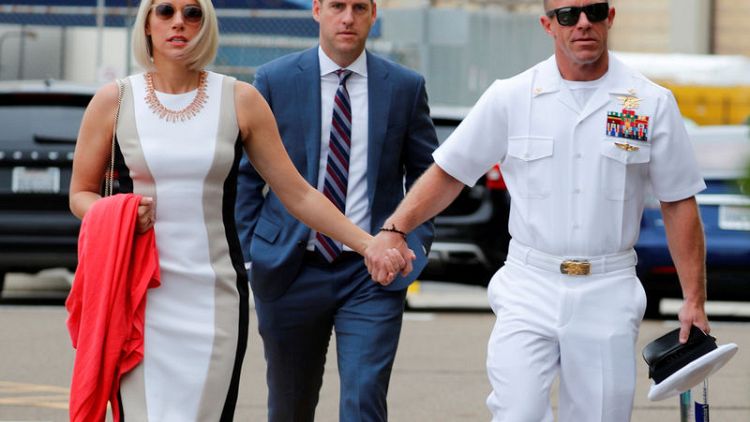By Marty Graham
SAN DIEGO (Reuters) - Defence lawyers in the murder trial of a U.S. Navy SEAL rested their case on Friday after three days of testimony contesting accusations that the platoon leader had fatally stabbed a wounded Iraqi captive and shot innocent civilians.
The last defence witness called by lawyers for Special Operations Chief Edward Gallagher was Navy Lieutenant Commander Robert Breisch, who testified that no one made a report to him accusing Gallagher of war crimes while his platoon was in Iraq.
After the defence rested, the presiding judge said he planned to give instructions to the seven-member jury on Monday before the two sides present closing arguments.
Breisch, the SEAL Team 7 troop commander during the 2017 Iraq deployment in question, testified that complaints about Gallagher had only involved personal, petty issues or tactical grievances, until months after the troops returned.
The Navy formally opened its investigation of Gallagher in September 2018, about a year after his platoon had returned to the United States.
Breisch told jurors that one platoon member suddenly "blurted out" to him in April 2018 that Gallagher had stabbed a prisoner. an accusation Breisch said came after word surfaced that Gallagher was up for a Silver Star medal, the San Diego Union-Tribune said.
Breisch's account was at odds with that of another defence witness, Master Chief Petty Officer Brian Alazzawi. He testified on Wednesday that Breisch was made aware of the stabbing allegation as early as October 2017, the Union-Tribune said.
Gallagher, 39, a decorated career combat veteran, is charged with committing premeditated murder of a wounded, teenage Islamic State fighter in his custody by stabbing him in the neck with a knife.
He is also charged with attempted murder in the wounding of two civilians, a schoolgirl and an elderly man, shot from a sniper's perch, as well as with obstruction of justice and other offences. Those include unlawfully posing for photographs with the dead captive's corpse.
Gallagher could face life in prison if convicted.
He has denied all charges. The thrust of his defence has been that fellow SEAL team members testifying against him under grants of immunity are disgruntled subordinates fabricating allegations to force him from the Navy.
In a major setback for prosecutors last week, a Navy SEAL medic testified it was he, not Gallagher, who caused the death of the Iraqi detainee by blocking the youth's breathing tube in what he described as a mercy killing.
On Thursday, an Iraqi general and a U.S. Marine who took the witness stand each testified he never saw Gallagher or anyone else stab or otherwise mistreat the captive before he died of combat wounds.
The case has drawn attention from U.S. President Donald Trump, who intervened months ago to order Gallagher moved from a military brig to less restrictive pre-trial confinement at a Navy base.
The judge later released him from custody.
(Reporting by Marty Graham in San Diego; Writing and additional reporting by Steve Gorman in Los Angeles; Editing by Clarence Fernandez)
